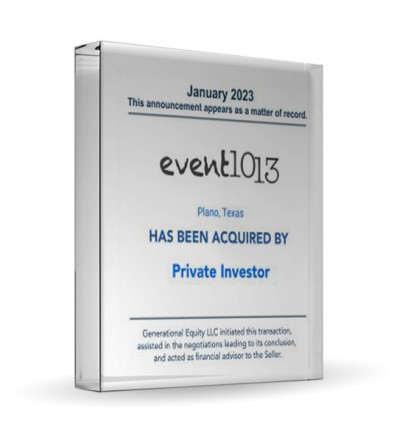
Due Diligence Checklist
By Generational Equity
05/06/2013
I met with a client a few weeks ago to tape a testimonial video. During the course of our discussion of the successful sale of his company, one of the topics we covered was the due diligence process. He put it simply when he said, “I had no idea how complex, detailed, and time consuming due diligence would be even though my deal maker warned me in advance what to expect. I am so glad that I had Generational Equity working with me to prepare me for due diligence.”
The key part of his statement relates to preparation. Most clients that I meet with post-sale tell me that due diligence was probably the most challenging part of the entire sales process. For those of you unfamiliar with the term, M&A due diligence is the process whereby a seller lifts the veil and the buyer is allowed to peer into the vital inner workings of your business. If you are not prepared for this, chances are good that the buyer will find something that you have not disclosed – good or bad – that may slow the deal down if not kill it.
The critical first step in the Generational Equity M&A process is a thorough and complete evaluation of your business. This allows us to start asking you questions about your company that will begin to prepare you for due diligence. Obviously the evaluation of every privately held company is unique to that company, your industry, and your specific set of circumstances. However, in general during our evaluation we will examine:
- The history of your business
- Your past earnings
- The company’s strengths, weaknesses, opportunities and threats (SWOT analysis)
- Business issues that you are addressing
- Business challenges and changes that you need to address
- We recast your financials to bring them into alignment with what they would look like if operated as a division of a publicly held company (removing all discretionary, non-essential expenses for example)
- An analysis of your historic growth in relation to your industry and end markets
- The creation of a five-year pro forma based on realistic growth expectations
Again, this list is not exhaustive and does not include all of the areas we examine with our clients. Your specific situation may require us to delve into other factors and areas as well.
Meet Your Deal Maker – Due Diligence Prep Part II
After the evaluation is completed and our client agrees with value and timing, we then take them to market and begin the process of looking for a buyer. But before we start this next process, our deal team does a second “due diligence” vetting and spends time working with the client to create an offering memorandum (OM).
The OM is largely based on the findings in the evaluation, but the deal maker will delve into even greater detail into any information that might lead him/her to believe that a “deal breaker” may be present. Again, this could be anything that is specific to our client’s company. Once the OM is completed and the deal maker is secure in his knowledge of the business and the company’s intangible assets (“off balance sheet” assets that specific buyers may find attractive), buyers are approached.
So you can see the first two phases in our process are designed to do two things:
- Raise any deal-breaking issues earlier rather than later
- Prepare the client to answer tough questions about the business
A typical due diligence checklist that a buyer would present to a seller contains 200-300 questions. Some are very standard and easily answered and may have already been covered in the OM or evaluation. Others can be very detailed and require significant homework on the part of the seller. Common discussions may include:
- Documenting the relationship with your key customers.
- Covering who are the valuable employees and if they will remain post-sale.
- The age of your equipment and if it is fully depreciated.
- Explain your unique, proprietary processes.
- Are your key processes documented in writing (or are they all between your ears)?
- Do you have a middle-management team in place?
- Explain any fluctuations in revenue/earnings the past 3 years.
- Document your pro forma revenue and earnings projections.
Again, this is just a sample of the types of questions on a due diligence checklist. If you have done your homework, due diligence can be navigated successfully. Certainly using a reputable experienced M&A advisory firm like Generational Equity will help your chances of closing immensely. But even our deals often face hurdles because buyers can be very cautious, especially post-recession, to close a deal. In fact, due diligence is now taking 30-40% longer than it did just a few years ago. Buyers are out there and active, but they are just being extra careful to make sure that the targets they are buying will generate the ROI they need.
If you would like to learn more about due diligence or the entire process of successfully selling your company, I invite you to attend a Generational Equity M&A seminar. We hold these throughout North America and they are specifically designed to help you learn how and when to exit your business for the most profit.
Carl Doerksen is the Director of Corporate Development at Generational Equity.
© 2021 Generational Equity, LLC All Rights Reserved



